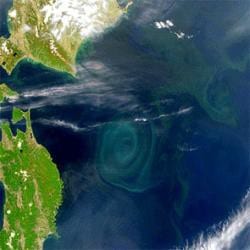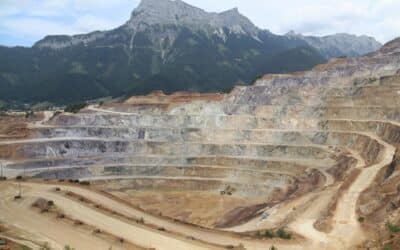International treaty aims to put rules on geoengineering.
The parties to the London Convention, an international treaty that governs ocean pollution, have agreed that large-scale ocean ‘fertilization’ isn’t yet justified, given gaps in scientific knowledge.
The convention, which regulates activities such as the dumping of garbage at sea, had not previously taken a stand on the notion of throwing nutrients into the ocean with the intention of promoting plankton growth. Such projects have been proposed to help increase ocean productivity and thereby boost the uptake of carbon dioxide from the atmosphere, combating climate change. But critics warn that little is known about the ecological effect of dumping large quantities of nutrients into the sea.
At its meeting in London last week, the convention endorsed concerns issued in June by its scientific advisory group about the possible effects of large-scale fertilization activities.
Representatives from 35 countries agreed that all forms of ocean fertilization should fall under the convention’s oversight. They agreed to study the issue further and create rules to govern such procedures, next year at the earliest. The rules would be binding to countries signed up to the treaty. Until then, they have urged national marine authorities to use the “utmost caution” when considering proposals for large-scale ocean fertilization operations.
Environmental groups have applauded the move. “We certainly welcome the outcome,” says David Santillo of Greenpeace’s science unit in Exeter, UK. “This intention to regulate ocean fertilization has a lot of political weight, and the view that such operations should not proceed at this time is just the sort of clear message we had hoped for.”
Blooming experiments
In the past, scientific experiments have created algae blooms by dumping iron or other nutrients into patches of ocean. But their findings about the rate of carbon sequestration and the effects on marine ecosystems were ambiguous. The methods have not yet been applied on a large or commercial scale.
Several private companies, including Planktos, based in Foster City, California, plan to fertilize patches of the ocean with iron, with a view to generating verifiable carbon credits that could be sold on evolving global greenhouse-gas-emissions markets.
The Australian company Ocean Nourishment Corporation in New South Wales is also planning to test the idea, this time using urea as a nitrogen-based fertilizer. The firm wants to dump 500 tonnes of dissolved urea in the Sulu Sea between Borneo and the Philippines.
“We do not have a fixed date for this experiment to take place,” says John Ridley, managing director of the corporation. “It is part of our ongoing R&D programme in demonstrating the feasibility of ocean nourishment.” The firm has not yet filed a formal application to the Philippine Bureau of Fisheries and Aquatic Resources for permission to perform the test.
Global commons
The statement of the London Convention will not in itself interfere with the experiments planned by Planktos and the Ocean Nourishment Corporation, which are currently only regulated by any countries overseeing the waters in question.
But environmentalists maintained calls for a voluntary, nation-by-nation moratorium on all fertilization operations until international regulations are in place.
Many also urge other international bodies to set up rules for other acts that interfere on a large scale with the ‘global commons’ of air and water. “We urge governments meeting at the United Nation’s Framework Convention on Climate Change in Bali next month to follow the London Convention’s lead and begin an international process to put all geoengineering technologies under international oversight,” says Jim Thomas of ETC, an environmental group based in Ottawa, Canada.



